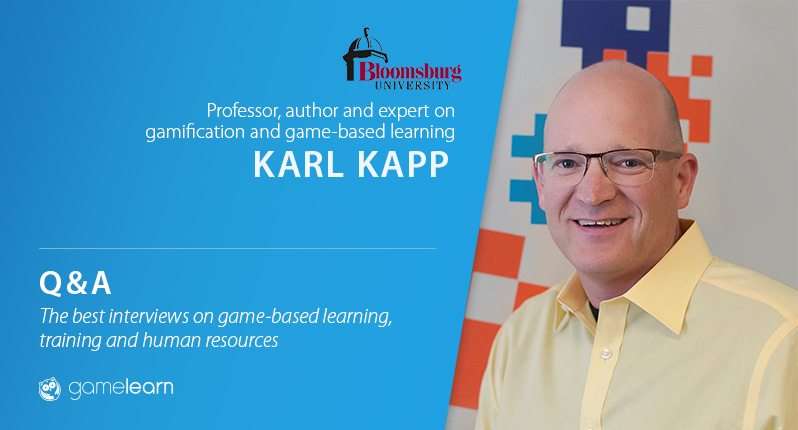“Games let us think and image things that would otherwise be unimaginable or unthinkable”
Karl Kapp is perhaps the greatest guru in the world of game-based learning. Assistant director at Bloomsburg University’s Institute for Interactive Technologies (IIT), his ideas about games, technology and learning are highly influential among institutions and companies alike. He is a prolific author (six books, including his recent Play to Learn), an enthusiastic gamer (he is consumed by Assassin’s Creed right now) and a humorous speaker. Some websites even hail him as a “rock star of e-learning”.
At Gamelearn we had the chance to sit down with him and talk about the advantages of gamification and game-based learning, the new trends in corporate training and the future of learning.
– First of all, we want to ask you how you got into video games and gamification as a tool for learning. When was it that you started linking video games, education and training?
– That is a good question. My day job is as a professor of instructional technology. So, many years ago, I was creating instruction for folks and at the same time my kids were growing up and playing lots of games. So, I thought: is there some way to combine the excitement that my kids have about the games and learning and development?
So I started to do some research into game-based learning, sort of look at how elements of games could be used for learning, and that became my book Gadgets, Games and Gizmos for Learning. And then I said: “I’m gonna do some more learning projects”. And that’s how I got started. So my kids really got me excited about the possibility of using games from a learning perspective.
– This is a very broad topic, but what would you say is the main advantage of using games for learning? What aspect would you highlight as the key?
– I think there are lots of benefits, but the biggest benefit is that a well-designed game allows you to think in a non-linear fashion. Most traditional instruction is very linear, and there is only one way to think or one way to go through it. But jobs are not like that. Jobs are very much system-related, there are lots of things coming at you from different directions, and one thing doesn’t necessarily lead to another. And I think the one thing that games can do really well is help us understand, deal with, cope with and learn in a method that is more systems thinking, more critical thinking than linear thinking.
– In one of your talks, actually, you mention the idea that video games allow you to “Drive on the Ocean”. That means they make you think outside of the box, think the impossible.
– Right! Exactly. I think games let us think and image things that would otherwise be unimaginable or unthinkable. And that is really valuable in a couple of different areas.
So, one, I will give you this example: way back in the 1970s, the company British Petroleum had a board game about becoming an oil tycoon. One of the situations in that board game was a catastrophic failure of an offshore well. And I just kept thinking to myself: if the executives have played that game and they have thought about the game, then they could think about what they need to do in case this happens. So, games where you role-play the scenarios let you think about different ways of solving that problem. And, actually, in some ways, they mentally prepare you for what you might think is impossible, what you might think can’t happen or isn’t going to happen.
So, the idea of “Driving on the Ocean” is the idea of taking games and using them to think differently than how you think on a day-to-day basis.
And one really great thing about games too is that they take you away from daily life. They put you in a game space and they let you experience the learning in a way that doesn’t have a lot of baggage to it, it doesn’t have a lot of pre-considered notions… because the game world that you are playing in is a different world to yours. So, this new world brings fresh eyes; and then once you have these fresh eyes and you experience that game world, you can generalize to the everyday job that you are in and then you are: “oh, yeah, I learnt that lesson when I was negotiating for a ship and now I understand what needs to be done”. So, I think the game space gives you that freedom to explore and think and do things that you normally wouldn’t do and allows you to think the impossible.
– What about corporate training? Is there any special advantage of using video games for learning and development?
– I definitely think engagement is a big plus of games. The interesting thing to me is that they engage people at multiple levels; they engage you at a cognitive level, so you have to think through certain things; they engage you at the emotional and affective level, so they give you an emotional gage of what’s happening; and they connect people and engage people on the social level. So if you play a game with other people, or if other people are playing the same game that you are, inevitably you are going to have discussions about “how did you do that?”, “hey, in this game, did you try this?”, etc.
So what games do is they provide engagement and connection on multiple levels and this is valuable in today’s corporate environment, where people are so heads-down, kind of doing their work that they don’t get to really interact in a deep way with anyone. They don’t interact with content that way, they don’t interact with peers that way… so game-based learning gives you this space in which you can connect on the cognitive level, on the affective level and on the social level.
And the other really interesting thing is that when you are playing a game and you are involved with the game, it evens the playing field. So you have just as much work or just as many frustrations as somebody who is your manager or your supervisor or even the executive vice-president. So you are all experiencing the same situation. Now, you might experience it differently because of your knowledge or somebody else’s knowledge, but you all have the same obstacles, the same elements that you have to overcome. The same general experience. And I think that provides a rich common-ground for people to compare ideas and concepts.
The other interesting thing research says is that one thing that makes an expert different than a novice is the range of experiences that experts have. And we know from the research that an experience can be created in a case study or a game-like environment. So, if you want, for example, to help your managers become vice-presidents, you can actually give them critical thinking game-based learning experiences and debrief them about these experiences to make decisions in the future, so you can put somebody in a high-stake situation in a game, while you might not want to do that in your actual company or organization.
– It’s very interesting what you said about leveling the playing field. Sometimes, when I talk to employees who have played some of our Gamelearn video games, they often say: “yeah, I could beat my boss in the game. And that’s something that doesn’t happen every day”.
– Yes, yes, that’s a good feeling! [laughs]
– You said before a “well-designed game”. Obviously, like everything in life, there are good games and bad games. What would you say is the most important factor for a serious game in order to be successful?
– That’s a good question. I think that much of the learning industry has really gone in the wrong direction. I think for a game to really be engaging and educationally meaningful, it has to be challenging. I have seen many games created in a corporate environment that are too easy; so easy, in fact, that they are not really a game.
If you look at entertainment games, they all start out with a challenge. A challenge you can do; it’s not impossible, but it’s not simple; and humans tend to work towards challenges. So when a game is introduced in a corporate environment, I believe that the most important thing for engagement is that there needs to be a relevant challenge. The challenge to manage time, challenge to negotiate, challenge to do whatever… if the video game just gives you everything, then you are not learning anything, you are not processing it, or working through it.
– Another challenge when designing a serious game is the difficult balance between entertainment and learning. In some of your articles, you talk about the importance of the concept of “learning first” when designing a game.
– Yes, exactly. When we think about a learning game or a serious game, we are creating it because we want to get some kind of a learning outcome. We have to develop a series of challenges, a series of information to help them learn through that process. So if we design it well, and think about “learning first” and creating learning challenges, then we think about what elements of the game match these challenges.
When designing a learning game or employing a learning game, I also think we need the debrief after the game. The research is pretty clear that for game-based learning to be most effective, after the game is played there should be a time of reflection, a time of debriefing, a time of discussion. Questions like “how would you do this in your actual work situation?” or “how would you translate this learning into your everyday job?”. So games are great learning experiences when designed well, they are even greater when there is this debriefing so that people understand what they have learnt.
– I don’t want to compromise you, but what are your favorite serious games?
– The thing about games is that they are so interesting because they are so varied. There are all kinds of different games for different types of subjects. So, for example, you guys have several games, like Triskelion, for time management, which I think is a great way to learn and to think about managing time; I think that’s a really good way to think about it.
You have also got your game on negotiation, Merchants. I think that’s a really great and challenging game. You know, negotiation is tough and it’s hard to do, but that’s an interesting way of thinking about gamification.
So the interesting thing to me is that games are so varied that you need to think, in my opinion, you need to think first about what you want to teach, and then pick the serious game that matches that kind of learning.
– What would you recommend to companies that are thinking about implementing a game-based learning program, but still have some doubts or are not sure it is going to work?
– Sometimes, people say: “we are very serious in our company, we don’t want to use games”. But if you think about the most serious human endeavor, like warfare, the US military has been using war games for literally centuries. And that’s pretty much life and death. If you look at medical games, serious medical games, it’s a huge growing industry. So, the first thing I would say is: “no matter what your topic is, it is not too serious for game-based learning or gamification”.
The second thing I would say is: “run a pilot test”. What I find often is that the decision maker would come to me and say: “Karl, we can’t use games, we are too serious, my people would never go for games…”. But then, you get the people who are actually doing the job, and they love it! They are like: “oh my God, this is such a good way to learn, I get so many insights from playing the game!” So, I would say: “run a pilot with people who are actually doing the job and need that type of learning”. I think that would help a lot and that would open their eyes.
And then, finally, understand that games are part of a larger learning curriculum. You are not just going to create a game around the corner and just learn from it. You have a bigger curriculum on whatever the topic is, and the game is part of that curriculum. So it’s debriefing part of the curriculum, so it is maybe role-playing, or whatever it has to be. But my advice would be: “don´t think of the game like a one-time event, because it’s part of a larger curriculum working towards behavior change”.
I
– There is definitely a growing interest in gamification and game-based learning all over the world. How do you see the current state of the industry?
– I think that 5, 6 or even 7 years ago, when I talked to people about game-based learning, they wondered: “Is it effective? Will it really work? I am not so sure about this”. But over the intervening years, people began to ask: “what is it about game-based learning that makes it work so well?”. The question now is: “how do I implement game-based learning effectively?”.
Now, don’t get me wrong: there are plenty of people who are skeptical and who don’t really understand the impact of it, but they are few. Most people I encounter say: “we need to engage our learners, we know we want to use some kind of game or gamification, but we are not sure how to implement it. We are not sure what the best method is for making sure that we get the learning outcomes that we want”.
A lot of trainers, organizations or learning and development folks, they did not have game-based learning growing up; so, to them, it is a completely new type of experience and they are not quite sure how to create a learning environment using games for learning, how to debrief, how to work the game content into what the learning outcome has to be. So I think the real need is helping people to understand how games can be implemented properly to ensure that the right learning outcome is the result.
– What about the future? How do you see game-based learning in about 5 or 10 years?
– There is a huge movement right now towards virtual reality. So I see some of the games going into a virtual reality stage.
I also see games being used to do a lot more kinds of outside of the box thinking. So, here is a game that shows our corporate strategy and says where our competitors are… now play this game and come up with unique or different strategies. Then people would be taking notes and then actually seeing if those strategies could then be implemented further. So I see games as almost being used for testing ideas about where the company would go in the future; to me, this is kind of an exciting way of thinking about games.
And then the other trend is kind of a transmedia thing. So, for example, you have a game, maybe Merchants, and you have some characters in the game who would help you with negotiation. And then, maybe, after you play the game, you get a message on your phone from one of the characters in Merchants telling you: “hey, reminder: here are two things you have to think about in negotiation”. So I see games expanding beyond the four walls of the game to interacting with you. So, a character from the game becomes a mentor outside of the game, giving you reminders and information, kind of just carrying on the learning from the game into an environment outside of the game.
– You recently published your latest book, Play to Learn. What can we find there?
I partnered with a woman named Sharon Boller. She and I do a workshop to help people understand how to create their own learning games. So we created the workshop for a couple of reasons. One: people come to us and say: “OK, I need a learning game and I have this idea and I hope to have it done by Friday”. [laughs] So I say: “wait a minute. That’s not how this works”.
So one of the reasons we did the workshop and the book was to show that it is kind of an involved process to create a learning game. You can’t just snap your fingers and have a learning game. So what we wanted to do is create a 9 steps process for how to create a learning game. So the book explains to anyone who wants to listen what the process is from start to finish. So we talk about playing games and playing learning games to understand how they work.
So the idea of that book is to: one, give people an understanding of what it takes to actually make a learning game and why it is so complicated and time-consuming. Sometimes people say: “oh, making learning games is so much easier than making entertainment games”. And no! It’s the exact opposite! Because in entertainment games you don’t have to worry about learning, whether anybody learns or whatever; but in a learning game you have to worry about both, keeping people engaged as well as making sure that learning is an outcome.
– I can feel you are very passionate about learning games. I also wanted to ask you, on a personal level, do you spend a lot of time playing games?
– Well, not as much as I would love to. [laughs] Right now I’m really consumed by the Assassin’s Creed series. So I’m on Assassin’s Creed Syndicate. I’m almost done with that, that’s really fun. I also play the Uncharted series in PlayStation, I really like that.
And then on my phone I have a version of Civilization. It’s called Civilization Lite and it’s such a great adaptation of a PC game to a mobile game. I think mobile is a great draw as well for games and gamification in the future.
So, yes, I really do like games. I’m also working on creating a couple of card games as well. So, I like both, the new games, but also the old school games.





